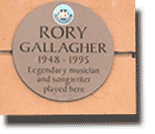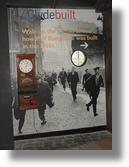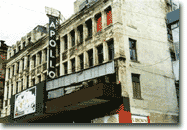Mar 17 2009
Does Belfast Remember Rory Gallagher?
 Some things just seem to naturally go well together; like Peaches and Cream, Frye & Laurie, or Fish and Chips. And then there’s that great combination of Rory Gallagher and Belfast’s Ulster Hall. Since the 70’s no other performer has played the Ulster Hall more times than Rory, nor has anyone filled the Hall on as many consecutive nights as the legendary G-man. Yet when the BBC announced recently the upcoming re-opening of the famous venue after a lengthy closure for refurbishment, there was no mention of the Irish guitar wizard on their list of famous bands who played the venerable hall. Oh they trotted out the usual suspects: the Stones, Who, Zep, U2, and even Coldplay got a nod — but no Rory. Here’s a link to the article by Chris Page on the Ulster Hall: Ulster Hall Reopening. Feel free to contact the BBC and voice your displeasure:
Some things just seem to naturally go well together; like Peaches and Cream, Frye & Laurie, or Fish and Chips. And then there’s that great combination of Rory Gallagher and Belfast’s Ulster Hall. Since the 70’s no other performer has played the Ulster Hall more times than Rory, nor has anyone filled the Hall on as many consecutive nights as the legendary G-man. Yet when the BBC announced recently the upcoming re-opening of the famous venue after a lengthy closure for refurbishment, there was no mention of the Irish guitar wizard on their list of famous bands who played the venerable hall. Oh they trotted out the usual suspects: the Stones, Who, Zep, U2, and even Coldplay got a nod — but no Rory. Here’s a link to the article by Chris Page on the Ulster Hall: Ulster Hall Reopening. Feel free to contact the BBC and voice your displeasure:
BBC Comments and Complaints
So what’s the big deal? What does it matter if they forget to mention Rory?
If there’s ever a city whose name seems forever linked to the term “war-torn” it’s Belfast. It was Belfast that saw the most intense violence of the August 1969 riots, what is commonly known as the start of “The Troubles”, and it was in Belfast on July 21, 1972, on “Bloody Friday”, that 22 bombs were set off killing 9 people and injuring 130 more. Belfast’s hotel Europa is considered to be “the most bombed hotel in the world.” During these tragic times, few musicians would play in the troubled city. The street outside of the Ulster Hall was christened “Bomb Alley,” and when Rory and his mates first performed in Belfast in 1971 you could hear the bombs going off in and around the city while they played.
The first night we played Belfast in ’71, there was ten bombs that went off around the city as we were playing…you’re always worried.– Gerry McAvoy, bass player for Rory Gallagher Band
Yet play they did. Every year, during the Christmas Holidays, Rory would perform at the Ulster Hall, seemingly immune to the violence that otherwise gripped the city.
Rory was accepted by all sides. I wouldn’t say he was untouchable but there was an element of that. Particularly at Ulster Hall…–Donal Gallagher.
So how many other big name bands would play at Belfast’s Ulster Hall during the height of “The Troubles”, and of those, how many would have come back a second time? Certainly not the bands that Mr. Page trots out to sell the grand re-opening of the famous concert venue. It was Rory, and only Rory, who stood by the Ulster Hall during those troubled times.
Nobody will come now, it’s impossible. There’s only Gallagher here who’ll do it. — Jim Aiken, Belfast’s legendary concert promoter
Rory Gallagher has once again returned to Belfast, at least he came, and for that we must thank him. Belfast has now become a graveyard for music. Concerts and big groups are a thing of the past…We want action now, for too long the groups in England haven’t given music where it can give the most help. Lennon tells us to give peace a chance, but has he visited us? All we want John ,baby, is the truth. Perhaps he is furthering the peace movements somewhere in Hyde Park. Perhaps the groups don’t want to make any sacrifices, maybe they are afraid, maybe they cannot stir themselves to help the people who need it most, who have no power to speak of.– excerpt from early 70’s Belfast underground paper,’Take One’.
Rory’s concerts at the Ulster Hall were packed to the gills with protestants and catholics alike and for a few brief hours there was a respite from those tumultuous times; for a few brief hours it became all about the music. Politicians could talk about bringing the two sides together, but it was Rory who could deliver, at least for those few shining moments. Of course, Rory, being the humble soul he was, would never in a million years claim any part of the credit for the easing of tensions in the stark battlefield that was 70’s Belfast. But I will. And hopefully others will too. The following is an excerpt from Roy Hollingworth’s review of Rory’s January 1972 concert at Belfast’s Ulster Hall.
I’ve never seen anything quite so wonderful, so stirring, so uplifting, so joyous as when Gallagher and the band walked on stage. The whole place erupted, they all stood and they cheered and they yelled, and screamed, and they put their arms up, and they embraced. Then as one unit they put their arms into the air and gave peace signs. Without being silly, or overemotional, it was one of the most memorable moments of my life. It all meant something, it meant more than just rock n’ roll, it was something bigger, something more valid than just that.
You just wanted to take the lid off the walls from around this hall and put it on a huge platform, raise it above the city and let just everyone see it, and hear it. Two thousand people together as one…–Roy Hollingworth, NME January 1972
Share on Facebook


 The close proximity of the largest coal fields and the richest iron-ore mines in all the British Isles kept the city of Glasgow in good stead for the ensuing Industrial Revolution, and Glasgow turned their new found industrial might to the building of ships and steam locomotives. “More ships were built on the banks of the Clyde before the war than in England, Germany and America put together.” These were exported throughout the world, and the term “Clyde-Built” became synonymous with solidity and reliability. In the 20th century however, Glasgow experienced a severe economic downturn as demands for ships and locomotives dwindled due to increase competition overseas. Today most of the shipyards on the River Clyde have disappeared; houses now stand where once the great oceanliners such as the Queen Mary and Queen Elizabeth were built.
The close proximity of the largest coal fields and the richest iron-ore mines in all the British Isles kept the city of Glasgow in good stead for the ensuing Industrial Revolution, and Glasgow turned their new found industrial might to the building of ships and steam locomotives. “More ships were built on the banks of the Clyde before the war than in England, Germany and America put together.” These were exported throughout the world, and the term “Clyde-Built” became synonymous with solidity and reliability. In the 20th century however, Glasgow experienced a severe economic downturn as demands for ships and locomotives dwindled due to increase competition overseas. Today most of the shipyards on the River Clyde have disappeared; houses now stand where once the great oceanliners such as the Queen Mary and Queen Elizabeth were built.
 The venerable theatre would not stayed closed for long however, and 3 short months later it reopened its doors under new management, Unicorn Leisure, and with a fresh coat of paint and new name: the Apollo Theatre. Under the experienced hand of Unicorn Leisure’s management, it became the leading concert house in all of Scotland. The sheer size of the venue and it’s elevated stage could be daunting, but the winning over of the typical Glaswegian crowd was the true test of a band’s mettle. A Glasgow audience was said to be one of the most demanding in the world. “Such was its reputation that one relieved act is reputed to have printed T-shirts saying: I Played the Apollo … and Survived.” — www.inthewilderness.com/apollo
The venerable theatre would not stayed closed for long however, and 3 short months later it reopened its doors under new management, Unicorn Leisure, and with a fresh coat of paint and new name: the Apollo Theatre. Under the experienced hand of Unicorn Leisure’s management, it became the leading concert house in all of Scotland. The sheer size of the venue and it’s elevated stage could be daunting, but the winning over of the typical Glaswegian crowd was the true test of a band’s mettle. A Glasgow audience was said to be one of the most demanding in the world. “Such was its reputation that one relieved act is reputed to have printed T-shirts saying: I Played the Apollo … and Survived.” — www.inthewilderness.com/apollo Rory Gallagher played the Apollo on 10 separate occasions and at least one time when it was still Green’s Playhouse. If Belfast was regarded as Rory’s “second home” then Glasgow was surely a close third, and when visiting Scotland’s ‘Second City’, the Apollo Theatre would have been his preferred “Stompin’ Ground”. Reviews of several of his performances there can be found in John Ganjamie’s excellant repository of articles at roryon.com:
Rory Gallagher played the Apollo on 10 separate occasions and at least one time when it was still Green’s Playhouse. If Belfast was regarded as Rory’s “second home” then Glasgow was surely a close third, and when visiting Scotland’s ‘Second City’, the Apollo Theatre would have been his preferred “Stompin’ Ground”. Reviews of several of his performances there can be found in John Ganjamie’s excellant repository of articles at roryon.com: 